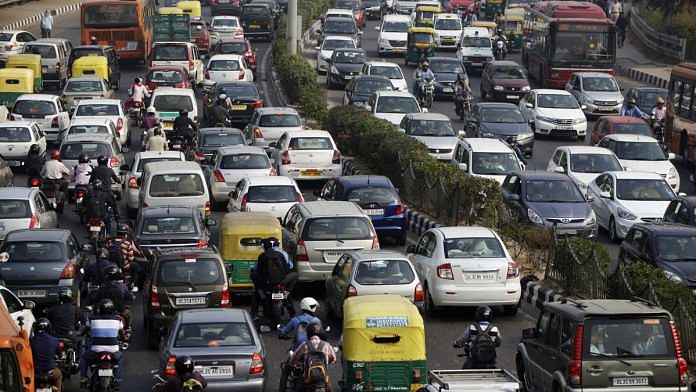New Delhi: Nearly 42 per cent families of road accident victims from low-income households said they were under debt after the crash, as compared to 11 per cent among high-income households, a World Bank study to assess the socio-economic impact of road crashes in India has found.
The study, conducted across 4 states — Uttar Pradesh, Bihar, Tamil Nadu and Maharashtra — also found that 27 per cent of the low-income households (the bottom 40 per cent of the population by per capita income) in urban areas and 48 per cent in rural areas availed of loans to mitigate the financial crisis.
A similar trend was noticed among high-income households (the top 10 per cent of the population in terms of per capita income). While 7 per cent of households in urban areas availed of loans, in rural areas, the figure was 30 per cent, says the study — a joint effort of the World Bank and Save Life Foundation, a non-profit advocacy group.
Also Read: 29,415 road accident deaths during lockdown, but no separate data on migrants, govt says
Data ‘alarming’
The study, released virtually by Union Road Transport and Highways Minister Nitin Gadkari Saturday, says the socio-economic burden of road crashes is disproportionately borne by poor households. Decline in total household income was sharper among low-income households (75 per cent) than high-income households (54 per cent).
According to the study, 24 per cent of respondents from low-income households reported selling/mortgaging their assets (land, jewellery) to meet daily expenses and repay their debt, compared to 7 per cent of high-income households.
“Resilience of households to deal with the financial impact of road crashes was, however, most fragile in Tamil Nadu. The proportion of low-income household respondents who stated that they had to sell off or mortgage their assets, take up extra work, and avail of compensation from the insurance company and other parties involved in the crash in order to deal with their financial burden, was highest in Tamil Nadu,” the report said.
Calling the figures “alarming”, Gadkari said his ministry will soon hold a meeting to discuss the World Bank report and appropriate policy will be framed to help low-income households that have suffered because of road crashes.
Women worst-hit
A total number of 2,499 interviews were conducted across rural and urban areas in the four states selected on the basis of several criteria, including demographic and geographical representation, magnitude of fatality burden, and socio-economic parameters such as economic growth, poverty rate and social welfare.
The key target groups included road crash victims/their family members who had suffered a serious injury or fatal crash, and truck drivers involved in a crash from January 2005 to July 2019.
The pilot survey was carried out from 7 May 2020 to 13 May 2020.
The study also found that within households, it is women who bear the brunt of caregiving activities, leading to a double burden of labour and mental load, exacerbated inequalities of opportunities in returning to livelihoods and income generating tasks.
According to a 2018 World Health Organization report, India tops the world in road crash deaths, with more than 400 fatalities per day.
A 2018 Union road transport ministry report said that India has 1 per cent of the world’s vehicles but accounts for 11 per cent of all road accident deaths and 6 per cent of total road crashes. In the last decade alone, road crashes have killed 1.3 million and injured over 5 million in India.
Insurance coverage, compensation
The study also found that lack of awareness about insurance coverage and delay in accessing compensation delayed the quick recovery process among low-income households.
Only less than a quarter of low-income household victims were aware of the compensation process and insurance clauses. Only a handful of the victims availed of government compensation/ex gratia, it adds.
Incidence of fatality after crash was also found to be higher among victims from low-income households, with 44 per cent of the households in rural areas reporting at least one death after a road crash compared to 11.6 per cent in urban areas. The risk of a victim suffering disability after a crash was two times more likely among low-income households in a rural area.
“The study aims to capture the socio-economic realities and nuances of road crashes at the sub-national level in India. It seeks to document inter-linkages between poverty, inequalities, road users, and road crash outcomes by analysing data from the four states,” said Arnob Bandopadhyay, lead transport specialist at the World Bank.
Recommendations
Among a slew of recommendations, the study said there is a need to institutionalise post-crash emergency care and make health infrastructure and coverage more accessible and inclusive.
“The central government should urgently implement the cashless treatment scheme under Section 162(2) of Motor Vehicles (Amendment) Act, 2019, reducing out-of-pocket-expenses for low-income households, increasing health insurance coverage and extending its scope to address post-crash disability and mental health effects,” the study said.
The study also recommends that the central and state governments provide a social security net for crash victims from low-income households through state support. Besides, the central government should create schemes to increase insurance coverage and penetration for low-income households, it adds. Insurance agencies should broaden the scope of insurance policies by including rehabilitation and recovery of crash victims, it says.
Also read: Parents of road accident victims should be compensated for loss of maintenance, says Delhi HC



